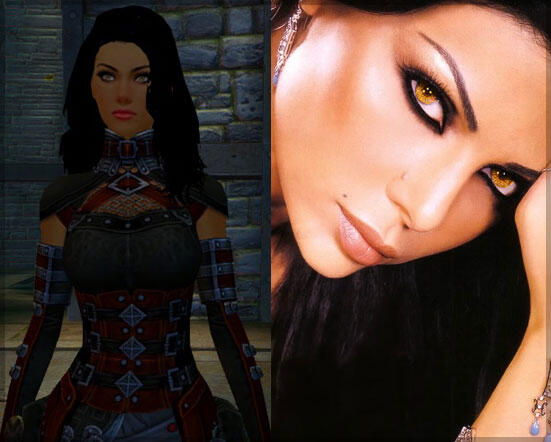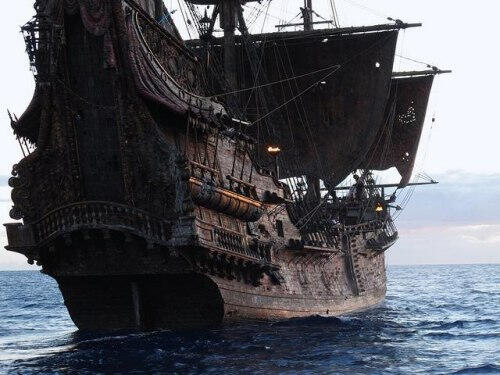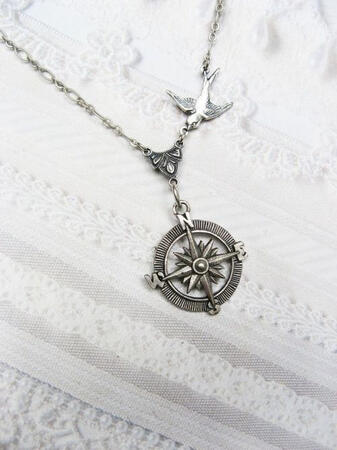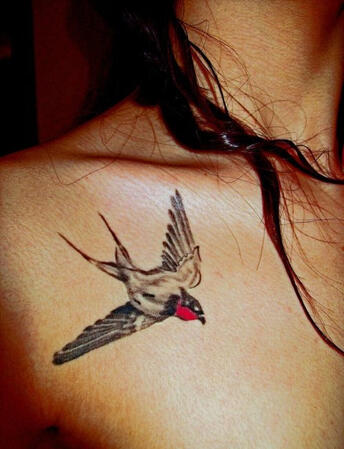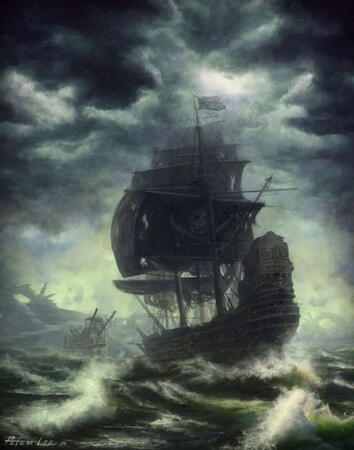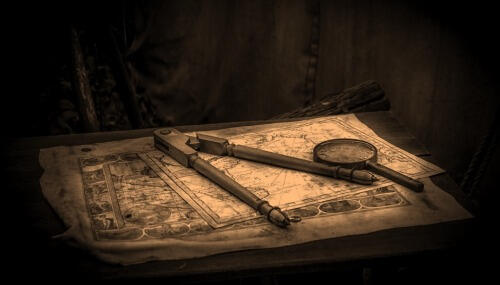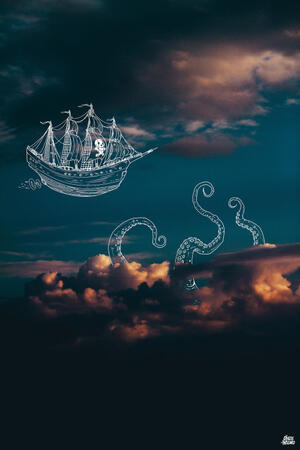
Kali Inaya
"We carry these things inside us that no one else can see,
They hold us down like anchors, they drown us out at sea."
Name: Kali Inaya
Age: 32
Gender: Female
Race, Nationality: Human, Istani
Profession: Sailor, Navigator, Treasure Hunter
Languages: Common, 'Drifter'
Kali Inaya is an illusion of life for a soul already dead. Guarded features offer little hint of what thoughts lie beneath golden eyes, ebony locks, and caramel-hued skin. She carries herself with a bristling pride and moves with a sharp feline prowl, a cat with claws as sharp as any blade. The scent of smoke whispers in heady aura around her, laced with the spiced clove of a vanilla and cinnamon hint. She bears the tattoo of a swallow on her right shoulder.
The Penitent
While she would never put a crew or a ship in danger, when danger presents itself, the woman tends to embrace it, dancing irreverently from one brush with death to the next. Unerringly brave yet driven by the thrill of danger, Kali's actions in such situations could easily be interpreted as reckless. Though she usually follows chains of command without question, anyone else would be hard-pressed to sway her from a decided course; a stubborn streak races through the Istani's veins as hot as any fire and fuels an incurable desire to prove herself against an impossible standard - to herself, her estranged family, her ancestors, and even the Gods themselves.
Raised within the fleet environment of the Sunveil Drifters, greatly sheltered from the influence of outside cultures, Kali bears a cautious distrust of land-dwellers and especially anyone not of Elonian descent. While she offers at least polite respect to humans (and to a degree, norns) of all nations, the other races are treated with disdain at best. Instilled in her by the meritocratic roots of the Sunveil Drifters, Kali values actions over words and demands a high standard and 'lead by example' attitude from those who would call themselves leaders.
The Lost
She'd heard the stories a thousand times over, the legacy of a people preserved over the crackle of a fire and the warmth of whiskey...
Kamadan, now Palawadan, was once known as the Jewel of Istan. Built around the enduring remnants of the Primeval Kings, the great port city was a shining beacon for travelers and Children of the Sun alike. Its people were a proud breed, the bravest and most accomplished of Elona - and prowling the borders in ever-vigilant watch was the formidable fleet of the Istani navy.
Many lost their lives to free Elona from the claws of Abaddon, and a once great land and once great people struggled to rebuild in the wake of Nightfall. Sixty years later Palawa Joko returned, and the land fell beneath the crush of his heavy hand.
As the provinces surrendered one-by-one to undead rule and the People of the Sun fled across the borders, the Seventh Squadron of the Istani navy vowed to remain together. A dozen ships strong, the naval families escaped to the seas with many refugees on board - and the Sunveil Drifters have sailed the waters of the world ever since.
The Loyal
Nearly two hundred years have passed since the refugee fleet set sail, and over the generations, the Istani heirs have held fast to their blended traditions of sailor, soldier, and gypsy alike. A nomadic people now roving the seas of Tyria and defined to a corsairs’ purpose, the Sunveil Drifters are a tight-knit piratical gypsy society with a colorful, yet guarded culture.
Within that culture, a tradition exists called the Drom. Bred upon the meritocracy of Istan, the Drom - meaning “road” - is a rite of passage for all members of the Sunveil Drifters. Upon reaching adulthood, young drifters voluntarily leave the ‘Vitsa’ (fleet) and the sea, venturing onto land in a quest to prove their mettle and earn the right to return.
Once upon a time, Kali Inaya and her brother left the Fleet and ventured out into Tyria - only to fail their quest and be declared outcasts with little hope of returning home.
Virtues and Vices
VIRTUES:
Insightfulness
Loyalty & Daring
Assertiveness & Tenacity
VICES:
Recklessness
Arrogance & Prejudice
Thieving & Manipulative
"They say she was born from the sea...and she's just as lonely and just as willing to swallow the world."
Kali rarely leaves the sea by choice but is known in Lion's Arch circles:
» Privateer
» Ship Navigator
» Smuggler & Trader
» Treasure Hunter
Other Hooks include:
» Spent some time as a Highwayman in Kryta
» Involved in Lion's Arch Underground
» Open to RPing with other 'Sunveil Drifters' Fleet characters
» Elonian Dancer and Singer
» My Server is NA Tarnished Coast «
» My in-game handle is: Stormangel.9045 «
» My Discord handle is: EmProphetic#2528 «
» Despite being on a NA server, I live in the UK «
» Available nights and weekends GMT «
» Will RP in-game, Discord, or Google Docs «
» Prefer one on one scenes or small groups «
» Open to dark/mature themes. Have a conversation with me if you have an idea «
» IC/OOC lines are important and non-negotiable «
» NO MINORS. 18+ Only. 25+ Preferred «
Sunveil Drifters Culture
Nomadic Lifestyle:
When the refugee ships escaped Elona in 1137 AE, the founding members of the Sunveil Drifters pledged to one day return and reclaim their homeland from the clutches of Palawa Joko. In dedication to that promise, they rejected the idea of resettling in a new home and following the traditions of the Elonian gypsies on board, they embraced a nomadic lifestyle at sea.
Hierarchy:
The Sunveil Drifters are led by a combination of the Baro, the Council of Phuri, and the Phuri Dae. The Baro is the central leader of the Vitsa, and he makes the majority of decisions regarding the community. The Baro is elected by the Council of Phuri - a collection of community elders - and is advised by the Phuri Dae, the spiritual leader of the community.
The Oral Tradition:
As a people on the move and surrounded by water, the Drifters didn’t have the opportunity to build libraries and fill them with books. While most gypsy children are taught to read and write, there is no great emphasis placed upon the act - viewed mainly as a Gaje endeavor. Their secretive and guarded nature also insists that the details of their culture not be put to paper, so the Drifters have long maintained an oral tradition. The myths, stories and beliefs of the community are therefore passed one generation to the next by bards, who are well-respected as the Keepers of Tradition.
Spiritual Beliefs:
The refugees of Elona share deeply religious roots. While the world acknowledges the departure of the Gods, the Sunveil Drifters believe that the power of the Gods is yet present, and they have maintained their traditional worship of the Six - with an emphasis placed upon the reverence of a main trinity over the other gods:
Lyssa: Keeper of Chaos – The Maiden of Waves
Dwayna: Keeper of Life – The Mother of Breath
Kormir: Keeper of Order – The Crone of Fate
Lyssa: Keeper of Chaos – The Maiden of Waves
Represents: Water, Chaos, Illusion
All things begin in Chaos. Upon the waves of the ocean, the story of the Sunveil Drifters began, and every chapter since has been written with the tides. Water is, therefore, not only an important symbol to the gypsy pirates, but an ever-present aspect of their lives. Though Lyssa takes many forms, she is revered among the Drifters primarily as the Maiden of Waves and the Keeper of Chaos.
Portrayed as two figures, Lyss and Ilya, eternally entwined, the twin goddess is also an adored representation of the blended heritage of the Drifters, and the duality that weaves through the culture: Past and Present, Pirate and Gypsy, Honor and Guile.
Just as Creation is born of Chaos, so too did the Sunveil Drifters emerge from the tyranny of war and the clutches of evil. According to traditional myth, it was beneath the blanket of chaos that the Fleet escaped the shores of Istan to the freedom of the Seas – an event for which Lyssa is annually thanked and celebrated during Nasi, the Festival of Maiden Voyage which takes place during the Season of the Zephyr.
The Ocean itself is a chaotic mistress; calm seas can give way to sudden storms and even the most planned of courses can be met with unpredictable circumstances. It is believed that Lyssa’s emotions manifest within these tides, and so offerings are often made to the goddess in beseech of smooth sailing. Lyssa’s ire has capsized many a ship, and her blessing turned the tide of many a nautical conflict.
Even for landlocked Drifters, chaos and illusion are prevalent themes when dealing with the Gaje – trickery, misdirection and dishonesty are staple aspects of successfully ‘running a rig’.
Dwayna: Keeper of Life – The Mother of Breath
Represents: Air, Life, Healing
From Chaos is born Creation. Though the ocean provides a home upon which the Fleet sails, it is the wind that billows the sails and gives life to the voyage, carrying the Sunveil Drifters upon their journey. As a Goddess of Air, it is therefore Dwayna that is revered as the Mother of Breath and the Keeper of Life.
Viewed as the Divine Mother, Dwayna is often depicted weeping for the sorrows of the world and its inhabitants. A guardian angel for all those in need, for the Drifters, she embodies the values of hearth and home. Believed to be the source of the Breath of Life, every birth within the Fleet is said to be blessed by Dwayna. Similarly, sickness within the community often sees an outpouring of offerings and prayer dedicated to the Keeper of Life.
While the Drifters still draw a firm line between themselves and the Gaje, within the community, every member is considered kin. Whether related by blood or not, every Drifter is brethren and must be treated as such. It is Dwayna’s will that guides the piratical gypsies to protect, care, shelter, and comfort one another without question or expectation of payment.
As the leader of the Gods, Dwayna is also a goddess favored by those in leadership positions, from the Baro of the Vitsa to the Elder Council to the individual captains of fleet ships. These (usually male) leaders often look to Dwayna for guidance in determining the course and direction of their people.
Kormir: Keeper of Order – The Crone of Fate
Represents: Order, Spirit, Divine Truth
Within Creation is found Order. The Drifters claim ancestral relation to Kormir, the truth of which is unknown and unverifiable. Yet regardless of the accuracy of such a claim, the Drifters themselves believe it. Kormir is therefore revered as the ultimate ancestral guardian - the Crone of Fate and the Keeper of Order.
As the hero of Elona and a mortal presence during the lifetime of the original refugees, Kormir is regarded as the divine Phuri Dae. Though she ascended at a young age, Kormir is said to appear to those gifted with the ‘Sight’ cloaked as a blind old woman. Believed to be a mystical representation of her wisdom, this fosters an additional reverence for elder women within the community.
Those gifted with the ‘Sight’ are said to be touched by Kormir, and a mystic is often referred to as a ‘Daughter of Kormir’. In addition to the traditional rite of passage known as the Drom, Daughters of Kormir also undergo a spiritual trial at some point in their twenties known as the ‘Dukkerin’. The Dukkerin is a test believed to be rendered by Kormir herself, and should a Daughter fail, she loses her ‘Sight’ and is shunned from the community.
Drifters believe that the spirits of their ancestors not only play a key role in advising a gypsy of his/her path but upholding the divine right of the community as a whole - to eventually return and reclaim Elona. Tied into this concept of divine right, the Sunveil Drifters also adhere to a traditional belief that no event ever is determined by chance. Fate lies therefore in the will of Kormir, who maintains the universal order and guides the Drifters to their ultimate destiny.
By the same token, luck is a very important concept for the gypsy Drifters.
Basht: “Good Luck.” Luck, good and bad, is considered a manifestation of the approval (or displeasure) of the ancestral spirits. Good luck or “Basht” is therefore a sure sign of ancestral approval. Many things and situations, ranging from amulets to full moons, are considered basht and believed to earn the favor of the ancestors.
Considered Basht:
Coins - Coins with holes cut into the center are often worn as good luck talismans.
Silver - For Health
Gold - For Wealth
Bronze - For Stealth
Spit - It’s good luck to spit in the ocean before you sail.
Tattoos - Tattoos not only tell their own stories, but tattoos and piercings are said to ward off evil spirits - gold hoops are especially good luck.
Shells - Shells are believed to keep wandering Drifters connected to the ocean. Gypsies on land often carry shells.
Prikaza: “Bad Luck.” Prikaza is believed to be the result of upsetting the ancestral spirits. When an ancestor is displeased by a Drifter’s actions, they are believed to mete out warning punishments in the form of bad luck or “Prikaza” - ranging from stubbing one’s toe to a dire illness or accident. Ancestral disapproval is most often earned by coming into contact with ‘mahrim’ things, creatures or people.
Mahrim: “Unclean and impure in a spiritual way.” With a rich blended gypsy heritage, the Drifters are a very spiritual people. Ritual cleanliness is of great importance to them, and certain things, creatures and people are believed to be tainted and inclined to earn the ire of the ancestors. Such things are avoided religiously by all Drifters.
Considered Mahrim:
Charr and Asura - Viewed as godless creatures
Food that Falls on the Floor - Once it has touched the ground, food cannot be eaten. There is no ‘three second’ rule for Mahrim!
‘Modern’ Doctors - Most barbers and doctors are considered bad luck as they deal with illness and death and do so by rejecting the ‘old ways’ for more modern medicine. Sick Drifters often simply rest through illness or recovery, or they rely on the Phuri Dae or other herbalism and natural-based healers.
Water - It is a custom to pay homage to Lyssa, the goddess of water, after filling a jug or a bucket by spilling a few drops on the ground as an offering. It is also considered highly ‘Mahrim’ to take a sip of any drink without first paying tribute to Lyssa.
Birds - Killing any bird of flight is considered ‘Mahrim’. Birds are believed to carry the souls of the dead to the Mists.
Whistling - Whistling on board a ship is believed to be an affront to the wind and will conjure a storm.
Red Heads - Red heads are thought to bring bad luck to a ship if you happened to encounter one before boarding.
The jury is still out on Sylvari. Though the Sylvari have an agnostic attitude towards the Six, they do have a mystical and almost-ancestral leaning. As such, the current Phuri Dae has not yet labeled the Sylvari as ‘Mahrim’.*
Sunveil Drifters Language
COMMUNITY
Baro — Literally “big man,” the Baro is the leader of the vitsa (fleet). Though the baro may often call himself a king around the Gaje, the position of Baro is an elected one – a tradition derived from the meritocracy of Istan. He is usually chosen by the council of Phuri (Elders) for a combination of cleverness, experience and wisdom. The Baro is advised by the Phuri Dae, or Wise Woman, who is a matron spiritual advisor to the vitsa.
Phuri – Elder respect is an ingrained aspect of Drifters culture. With age and experience comes wisdom, and all male elders are given a voice in the Council of Phuri. The Phuri choose the Baro of the Vitsa, and similarly can elect to replace him if he fails to serve the Drifters well. The Phuri also guide the future of the community by reviewing and approving every Drom, a ‘rite of passage’ pilgrimage for young gypsies.
Phuri Dae – Considered the voice of Kormir, the Phuri Dae is the Vitsa’s spiritual leader and an advisor to the Baro. An elder with the ‘Sight’, each Phuri Dae chooses her own successor from among the Drabarni in the community.
Drabarni - Also ‘Daughter of Kormir’. Once in a while, a Drifter is born gifted with the ‘Sight’, the ability to see and speak with the dead as well as glimpse the future. Always a woman, these gifted few are revered, if sometimes distantly, among the gypsies. Those gifted with the ‘Sight’ are said to be touched by Kormir and are often referred to as a Drabarni or a ‘Daughter of Kormir’.
Dukkerin - In addition to the traditional rite of passage known as the Drom, Daughters of Kormir also undergo a spiritual trial at some point in their twenties known as the ‘Dukkerin’. The Dukkerin is a test believed to be rendered by Kormir herself, and should a Daughter fail, she loses her ‘Sight’ and is shunned from the community.
Drom - The Drom is a rite of passage for all young members of the Sunveil Drifters. Upon reaching adulthood, young gypsies voluntarily leave the Vitsa (fleet) and the sea, venturing onto land in a quest to prove their mettle and earn the right to return.
Vitsi – The Vitsi is the central fleet of the Sunveil Drifters. One’s connection to the vitsa is the most important social tie that any Drifter has. The Fleet follows a similar circuit through the seas that takes about a year to complete, so even Drifters on land have a vague idea of where the Fleet might be at any given time.
SUPERSTITION
Gaje (pl) Gajo (masc.) Gaji (fem.) — All non-Gypsies – or more loosely, any person not of Elonian heritage. The Drifters are by nature of their existence very insular people, and the Gaje are often viewed with suspicion or caution. Gaje are often viewed as foolish and honorless, and thus it is considered all right to trick, swindle and steal from them when it is necessary. Drifters are raised to believe they are something special, touched by destiny in a way no Gaje could ever understand.
Basht — “Good Luck.” Luck, good and bad, is a very important thing to the gypsies - considered a manifestation of the approval (or displeasure) of the ancestral spirits. Good luck is therefore a sure sign of ancestral approval. Many things and situations, ranging from amulets to full moons, are considered basht and believed to earn the favor of the ancestors.
Prikaza — “Bad Luck.” Prikaza is believed to be the result of upsetting the ancestral spirits. When an ancestor is displeased by a Drifter’s actions, they are believed to mete out warning punishments in the form of bad luck or prikaza - ranging from stubbing one’s toe to a dire illness or accident. Ancestral disapproval is most often earned by coming into contact with ‘mahrim’ things, creatures or people.
Mahrim — “Unclean and impure in a spiritual way.” With a rich blended gypsy heritage, the Drifters are a very spiritual people. Ritual cleanliness is of great importance to them, and certain things, creatures and people are believed to be tainted and inclined to earn the ire of the ancestors. Such things are avoided religiously by all Drifters.
PEOPLE AND TITLES
Chikni (CHEEK-nee) — Son
Chikno (CHEEK-no) — Daughter
Dadro (DAH-dro) — Father
Dai (DIE) — Mother
Bibio (BEE-bee-oh) — Aunt
Kako (KAH-koh) — Uncle. It is also a respectful form of address for any older man.
Monisha (ma-NEE-sha) — Wife.
Palesko (pal-ESS-ko) — Nephew
Penyaki (pen-YAWK-ee) — Niece
Phei (FAY) — Sister
Prala (PRAH-lah) — Brother
Simensa (see-MEN-suh) — Cousin (both genders). Also a looser term for fellow gypsies.
Baba — A term of respect for an old woman, used before her name (ex. Baba Yaga)
Baro moy — “big mouth,” a gossip
Dilo (DEE-lo) — a fool or imbecile (a favorite word for the Gaje!)
Drabarni (dra-BAR-nee) — A Drifter mystic
Glata (GLAH-ta) — children
Joovi (JOO-vee) — woman (in general)
Moosh — man (in general)
Phuro (FOO-roh) (pl. Phuri) — A wise and respected elder, used before his or her name
Ves’tacha (VESS TAH-cha) — “Beloved,” a term of great affection
Chavi (CHA-vee) — a Gypsy girl - All Drifters are addressed as such until completion of their Drom.
Chavo (CHA-vo) — a Gypsy boy - All Drifters are addressed as such until completion of their Drom.
Rai (RYE) — “Sir,” a term of respect given to every Drifter upon completion of their Drom.
Rani (RAH-nee) — “Lady,” a term of respect given to every Drifter upon completion of their Drom.
NUMBERS
Jek — 1
Dui — 2
Trin — 3
Shtar — 4
Panj — 5
Shov — 6
Efta — 7
Otor — 8
Enija — 9
Desh — 10
COMMON PHRASES
Ahai (ah-HAI) — Elonian Greeting
Av akai (AHV ah-KIE) — “Come here”
Baksheesh! (bok-SHEESH) — “Good Fortune!” — A blessing and toast
Chavaia (cha-VIE-ah) — “Stop”
Gestena (gess-TEN-ah) — “Thank you”
Latcho Drom (LAH-cho DROHM) — “Good Journey” - a traditional Drifters farewell
Misto! (MEESE-toe) — “Wondrous!” — An exclamation of joy equivalent to our “Cool!”
Sar’shan? (sar’SHAWN) — “How are you?”
Sastimos! (sass-TEE-mose) — “Good Health!” — Both a greeting and a toast
Shesti! (SHES-tee) — “Nonsense!”
PIRATEY TERMS
Ahoy — An interjection used to hail a ship or a person, or to attract attention.
Avast! — A command meaning stop or desist.
Becalmed — The state of a sailing vessel which cannot move due to a lack of wind.
Belay — (1) To secure or make fast (a rope, for example) by winding on a cleat or pin. (2) To stop, most often used as a command.
Bilged on her anchor — A ship holed or pierced by its own anchor.
Black spot — A black smudge on a piece of paper used by pirates as a threat. A black spot is often accompanied by a written message specifying the threat. Most often a black spot represents a death threat.
Blow the man down — To kill someone.
Bring a spring upon her cable — To come around in a different direction.
Crack Jenny’s tea cup — To spend the night in a house of ill repute.
Dance the hempen jig — To hang.
Hempen halter — The hangman’s noose.
Jack Ketch — The hangman. To dance with Jack Ketch is to hang.
Deadlights — (1) Strong shutters or plates fastened over a ship’s porthole or cabin window in stormy weather. (2) Thick windows set in a ship’s side or deck. (3) Eyes.
Give no quarter — The refusal to spare lives of an opponent. Pirates raise a red flag to threaten no quarter will be given.
Grog blossom — A redness on the nose or face of persons who drink ardent spirits to excess.
Handsomely — Quickly or carefully; in a shipshape style.
Hang the jib — To pout or frown.
Hornswaggle — To cheat.
Loaded to the gunwalls — To be drunk.
Long clothes — A style of clothing best suited to land. A pirate, or any sailor, doesn’t have the luxury of wearing anything loose that might get in the way while climbing up riggings. Landsmen, by contrast, could adorn themselves with baggy pants, coats, and stockings.
No prey, no pay — A common pirate law meaning a crew received no wages, but rather shared whatever loot was taken.
Run a rig — To play a trick.
Scupper that! — An expression of anger or derision meaning “Throw that overboard!”
Show a leg! — A phrase used to wake up a sleeping pirate.
Splice the main brace — To have a drink or perhaps several drinks.
Squiffy — Somewhat intoxicated; tipsy.
Take a caulk — To take a nap. On the deck of a ship, between planks, was a thick caulk of black tar and rope to keep water from between decks. This term came about either because sailors who slept on deck ended up with black lines across their backs or simply because sailors laying down on deck were as horizontal as the caulk of the deck itself.



